
Soil Hydro-Physics Laboratory
The Soil Hydro-Physics (SHP) lab is part of Wageningen University and Research (WUR). Thereby the lab is an integral part of the research and advisory work done in the field of 'soil-water-atmosphere'. In the lab we analyse soil samples on, mostly water, gas and nutrients flow and retention. A few examples are the soil water retention (pF), hydraulic conductivity, water stress phenomena, soil structure issues, and capillary water.
Droevendaalsesteeg 3
6708 PB Wageningen
Wageningen Campus
Read more
Thanks to the organizational structure of Wageningen University & Research, we can easily look for contacts for you in other departments/groups, e.g. Remote Sensing, Ecology, Water Management, Land Restructuring or Animal Science.
How are we unique?
The Soil Hydro-Physics lab is a combination of a research lab and a standard lab, and part of an institute of knowledge - so both basic knowledge of the methods as well as understanding of the theory behind them is available. With this knowledge and experience you can always be assured of sound analysis results, and you have a partner who can really understand your research question(s). The combination of these conditions and the extensive variety of measurements that we can do is unique in the Netherlands.
Examples of projects conducted in the lab
The soil physical lab is frequently used in big research projects, e.g. large EU projects, the failure of the Wilnis dike, the pilot for the waterstorage area Salland, calibration measurements for the KNMI, pilots for under water drains in the peat meadow areas, and building of soil physical properties databases such as the Staring series and Priapus-BIS. The lab is also often used for Phd research projects, for example research into the effects of forest fires on soil water conductivity and water repellency.
What is our ambition and motivation?
As managers of the lab we take care that the facilities are kept modern and up-to-date. We are always looking for new techniques and ways to improve exiting methodologies in order to be of greatest service to our clients.
Orders
Orders can be made by completing the order form below and mailing this form to one of the lab controllers
Read more
The lab controller will contact you about planning and reservations. If you want to do your experiments yourself AND if you are not a Wageningen UR employee, please also complete the Gebruiksovereenkomst below.
If you want to do your experiments yourself, we assume you have the right skills to operate the equipment. If not, then we will make a mutual agreement in which we provide you with the needed support to complement your knowledge. For further explanation see the web page Public Use of Facilities.
Public use of facilities
Do you need laboratory facilities, but do you think they are too expensive to maintain? Or do you want to let your own personnel perform experiments, but don't you have the necessary facilities? The Soil Hydro-Physics Laboratory gives you the opportunity to use its climate controlled rooms and associated equipment for general use.
Read more
Who can make use of the lab facilities?
All interested people not related to Wageningen University & Research, or users not belonging to the fixed group of lab users within Wageningen University & Research can make use of the facilities.
Why do we make our facilities public accessible?
Well-equipped laboratories are of great importance to Wageningen University & Research as our research depends on it. By making the lab widely known as well as public accessible for a small fee, we think this makes us capable to keep the facilities at a higher level of maintenance and in a modern state. In addition, it promotes the mutual exchange of knowledge. Both aspects are beneficial for new users as well as for existing users.
Workaround
Do you want to make use of the lab, then please contact one of the lab controllers as mentioned in the Contact tab. After consultation we determine the required experiments and the period in which they have to be performed. Once this period is determined it will be compulsory since other reservations must not be affected. Next, the "Gebruiksovereenkomst" must be completed and send to us. We assume you have the right skills to operate the equipment. If not, then we will make a mutual agreement in which we provide you with the needed support to complement your knowledge. The needed forms are available on the Orders web page.
Don't want to do it yourself?
If you rather let our experienced personnel do the experiments, then this is possible at all times. In that case the "Gebruiksovereenkomst" doesn't have to be completed.
Student subjects
In the soil hydro physics lab there are regularly possibilities to do a master thesis project or a research practice project. In the following you can read about some potential topics, you will get more information on the topics and the contact persons for those topics by clicking on the links in the text/ pdfs. This is just a selection of possibilities, in case you are interested in doing a thesis or research project here, please contact Loes van Schaik for an orientation discussion.
Read more
Improve soil hydrology with organic amendments and earthworms
Climate change leads to more frequent drought and high intensity rainfall events. In recent years, arable production suffered from both, with droughts being particularly impactful on sandy soils. Innovations are needed to prevent freshwater reserves from being depleted and crop production from being water-limited. Against this background we wish to design measures to improve infiltration and soil water retention through selective amendment of organic matter that promotes soil water. However, we do not know which quality of organic matter is particularly effective in promoting soil water retention. Additionally earthworms in combination with organic matter might speed up soil structure formation and enhance the influence of organic amendments on soil water retention. In this thesis study, you will design an experimental set-up to test several types of organic matter and or earthworm compositions on their capacity to improve soil water retention.
Use of salts for pF measurements
For many types of Soil Physical measurements to be compared properly, the soil should be brought to a certain pF value. This can for example be done at a sandbox or in in a pressure chamber. However, these methods are often not suitable for soil samples that are in the form of aggregates of other shapes. In literature the option is proposed to use a salt solution in a closed chamber and to use Vapor Equilibration to bring soil samples to a certain pF value. First experiments in our Soil Hydro Physics laboratory have been done and give promising results. further development of this method could be a master thesis topic.
K050- unsaturated conductivity measurement
Unsaturated hydraulic conductivity is difficult to measure. A new measurement set up has been developed to measure the hydraulic conductivity at small suctions ( 50cm<h<0cm). This set up has still to be tested in the laboratory. For a student interested in soil physical measurement methods this would be a nice bachelor or master topic.
Microplastics in urban environments
Microplastics cause a high degree of concern worldwide, since they are poorly controlled. This pollutant is studied a lot in aquatic environments and more recently also agricultural soils. However, there are few studies involving microplastics in urban spaces. In this context, there are still various potential research questions for a bachelor or master student, such as quantification of the local distribution of microplastics according to different vegetation characteristics or improvement of the laboratory methods for extraction and quantification of microplastics.
Determinations
Determinations performed in the Soil Hydro-Physics lab can be divided into four themes. For an indication of prices please contact Gerben Bakker or Harm Gooren.
Research in the Soil Hydro-Physics lab.
The Soil Hydro-Physics lab is used for different kinds of research. On this page you will find a selection of recent and current lab-related research.
Read more
Reference Samples for soil physics measurements

In close collaboration with University of Liege, Gembloux Agro-Bio Tech, the Soil Hydro-Physics lab is trying to develop reference samples that could allow us to cross check our measuring techniques, perform quality controls and detect abnormal discrepancies between devices.
By Dr. Aurore Degré, 2014
This project gains towards intercomparison of soil physics lab measurements and improve the measurements quality. Soil physics lab measurements mostly involve undisturbed soil samples. The readings are of course dependent on the soil properties, but they can also be affected by the measurement devices and procedures. The repeated wetting, drying, heating cycles operated in the soil physics measurements are challenging because the reference samples should remain as stable through time as possible and avoid clogging by microbial development or nanoparticles.
Lab, field versus Remote Sensing

Clay soils have the specific property to swell upon wetting and shrink when drying out. This causes very small, but measureable, soil surface elevation, which can be linked to the soil water content. Driven by a need to measure soil water storage on large scales and with a high resolution, Bram te Brake of the Soil Physics and Land Management group of Wageningen University, currently studies the possibilities to measure clay swell and shrinkage on large scales to estimate soil water storage change. The nested scales of the soil physical processes involved ask for an innovative combination of small scale laboratory measurements, field data collection and remote sensing techniques.
Large scale measurements in hydrology and soil physics nowadays highly rely on remote sensing techniques. Satellite based Radar Interferometry (InSAR) is a technique capable of measuring mm to cm scale surface elevation changes. These can result from clay swell and shrinkage. The specific property of clay to swell and shrink, combined with its mineralogical and hydraulic properties, make that relations between soil moisture content, soil volume and soil moisture sensor output are not straightforward.
The soil physics laboratory facilitated techniques to establish the relation between soil water content, shrinkage cracks and sensor output. Field measurements and measurements in the soil physics laboratory were carried out to quantify the relation between clay aggregate volume and water content. Both measurements show a highly linear relation between volume and water content of the soil. This relation can be used to convert surface elevation changes to soil water content changes.
The possibilities and limitations of this approach using Radar Interferometry are investigated. The study shows great potential for this new application, although limitations arise in vegetated areas. Careful selection of measurement sites is therefore required. Upcoming data analysis techniques and satellite missions can boost the use of Radar Interferometry in soil physical research. Soil physical laboratory and field measurements play a crucial role to revealing the underlying processes and calibrate and validate remote sensing observations.
Earthworms increase greenhouse-gas emissions
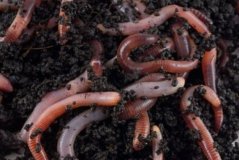
Earthworms play an essential part in determining the greenhouse-gas balance of soils worldwide, and their influence is expected to grow over the next decades. They are thought to stimulate carbon sequestration in soil aggregates, but also to increase emissions of the main greenhouse gases carbon dioxide and nitrous oxide. Hence, it remains highly controversial whether earthworms predominantly affect soils to act as a net source or sink of greenhouse gases. This research of Ingrid Lubbers, Lijbert Brussaard and Jan Willem van Groenigen is published in Nature Climate Change.
Earthworms increase greenhouse gas (GHG) emissions from soils, reveals new research published in the current issue of Nature Climate Change. The overall increase is severe: 33% for carbon dioxide (CO2) and 42% for nitrous oxide (N2O). “This is bad news for our battle against global warming,” said Ingrid Lubbers, PhD candidate in the Soil Biology group of Wageningen University, part of Wageningen UR, and lead author of the study. "Earthworms may help us to produce more food through improving soil fertility, but by doing so they also contribute to global warming by increasing GHG emissions from soils".
Lubbers, along with colleagues from Trinity College Dublin, the University of California at Davis and the International Center for Tropical Agriculture in Cali, Colombia, gathered all relevant published research to date: 57 different experiments. The common theme in the experiments was that they all measured how earthworms influence the net soil GHG emissions of CO2 and/or N2O, as well as their influence on soil organic carbon (SOC) stocks.
A statistical technique called meta-analysis allowed the research team to discern overall patters in the huge body of experimental data. “The claims on the effects of earthworms on soil GHG emissions in the literature varied widely," explained Dr Jan Willem van Groenigen of Wageningen University and co-author of the study. “For N2O, the story appeared to be relatively clear: our own experimental studies, as well as those of other research groups, strongly suggested that earthworms increase emissions of this GHG. For carbon, the publication record showed conflicting views. Some studies reported increases in CO2 emissions, whereas others suggested that earthworms might stimulate carbon sequestration in SOC, thereby neutralizing or even overcompensating the effects on N2O".
However, after analysing the data a clear pattern was observed: "Earthworms increase emissions of CO2 (33%) as well as N2O (42%), and there are no indications that they affect SOC stocks in soils”, says Kees Jan van Groenigen, research fellow at Trinity College Dublin and co-author of the study.
Earthworms probably increase GHG emissions through a combination of mechanisms, as they change the soil environment in many different ways. They mix organic plant residues in the soil, which may increase decomposition and CO2 emissions. Moreover, the earthworm gut also acts as a microbial incubator, boosting the activity of N2O-producing microbes. Finally, by burrowing through the soil, earthworms make it easier for GHGs in the soil to flow to the atmosphere.
The research team found more detailed patterns. “Earthworms stimulated N2O emissions most strongly in soils with high SOC contents,” explained Professor Johan Six of the University of California and co-author of the study, “this suggests that earthworm-induced N2O emissions can be a side effect of increased soil C inputs, such as rhizodeposits from plant roots or litter incorporation, and it raises the question whether earthworm-induced N2O emissions are an inevitable consequence of earthworm-induced C sequestration as well."
"This is important information for our fight against global warming", Jan Willem van Groenigen continued. "Soils are a major player in regulating global warming. There is more C in SOC than in atmospheric CO2, and agricultural soils are by far the largest source of N2O emissions, because these soils receive large amounts of N fertilization. Small changes in soil GHG dynamics can therefore have important repercussions for global warming. It is rather unfortunate that earthworm presence, which we try to stimulate in sustainable agriculture due to their positive effect on soil fertility, at the same time has an unwanted effect on GHG emissions".
However, the earthworm/GHG knot is far from being disentangled. Many questions remain: it is not yet clear to what extent stimulating effects of earthworms on plant growth can negate earthworm-induced increases in GHG emissions. “Our literature search also pointed out a large gap in the published studies. We need more experiments that include growing plants, as well as more long-term studies and more field studies before we can decide to what extent global worming leads to global warming,” Lubbers concluded.
Article: Lubbers IM, Van Groenigen KJ, Fonte SJ, Six J, Brussaard L and Van Groenigen JW. 2012. Greenhouse gas emissions from soils increased by earthworms. Nature Climate Change.
Exploring the relationship between soil mesofauna, soil structure and N2O emissions.
We analysed soil structural parameters using X-ray tomography to explain the role of soil mesofauna in nitrous oxide emissions (N2O) from agricultural soil. The experiment was set up in the Soil Physics Laboratory:

Potworms, fungivorous mites and predatory mites were introduced into the microcosms (and all of their combinations):
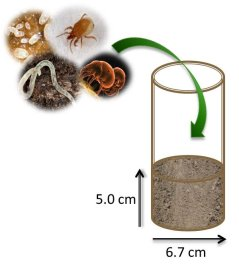
Potworms accelerated peak N2O emissions, but neither fungivorous mites nor predatory mites nor their interactions had a significant effect on N20 emissions.
Soil scanning (X-ray tomography) was performed using the v[tome]x m (Phoenix X-ray/General Electric). Potworms clearly affected the soil structure by increasing the volumetric air content and altering the pore size distribution. In addition, visual observations indicate a more continuous pore network in the soil microcosms when potworms are present:
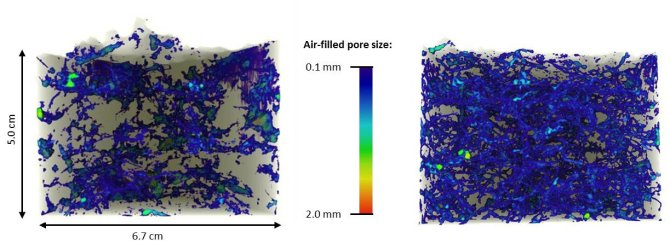
In conclusion: soil structure is an important pathway driving faunal-induced N2O emissions, and soil ecosystem engineers such as potworms disproportionally affect N2O emissions as compared to other soil fauna.
Reference:
Porre RJ, Van Groenigen JW, De Deyn GB, De Goede RGM, Lubbers IM (2016) Exploring the relationship between soil mesofauna, soil structure and N2O emissions. Soil Biology & Biochemistry 96:55-64.
Soil Hydro-Physics sampling site more accurate with sensor technology.
The Dutch Soil Information System (SIS), which is part of the Key Registration Subsurface (BRO), includes a representative database of Soil Hydro-Physics (ShP) data of the Netherlands. The Soil, Water, Land use team of Wageningen Environmental Research (WENR) has been busy updating this data in the past year. This includes field sampling and analyzing new samples in the lab. The sampling locations are usually selected based on existing soil maps and profile data in BRO/SIS. To improve this methodology and to make it smarter, sensor technology has been used. An important goal for 2016 was sampling of heavy-loam soils, because their representation in the BRO is relatively low.
To be more sure about the occurrence of the heavy loam soils during sampling, two test location were selected for a trial. On these locations the most optimal sampling point is determined within the chosen plot by means of sensor technology. With the gammaspectrometer of Medusa Explorations the texture of the topsoil was measured in situ (Figure 1).
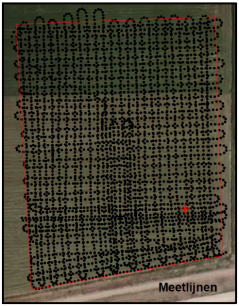
A gammaspectrometer measures the natural radioactivity of the soil (0-30 cm), which is related to the texture of the soil. The measurement data are converted to clay content, and texture classes, using a general correlation for the Netherlands (Figure 2).
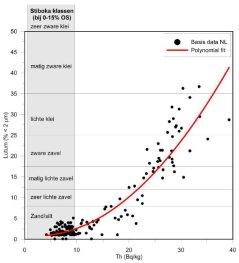
Based on this data in both cases the sample point, that was initially selected based on data in BIS and the soil map, was moved over short distances (Figure 3).
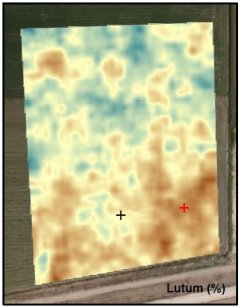
The clay contents, as predicted by the gammaspectrometer, differs by 0.5% with the lab measured clay contents. The use of the sensor reduced the risk of "failures" in the field. A very good result and a useful application of sensor technology.
Literature
Van Der Klooster, E., F. M. van Egmond, M. P. W. Sonneveld, 2011. Mapping soil clay contents in Dutch marine districts using gamma‐ray spectrometry. European Journal of Soil Science, Vol.62(5), pp.743-753
Links and software
Here you will find internal and external links and software
Read more
External Links
Internal Links
Project Share Soil Physics Laboratory (Open file, then CTRL+click)
Management Rules and Planning Cold Store A016 Atlas building
Software
The Staringreeks is free to use. There is however no further support to the software. For a proper use of the Staringreeks we refer to chapter 4 of the accompanying report (Wösten et al., 2001. Waterretentie- en doorlatendheidskarakteristieken van boven- en ondergronden in Nederland: de Staringreeks; vernieuwde uitgave 2001. Wageningen, Alterra-rapport 153). This can be downloaded here.
Publications
Read more
Publications
-
Measuring Hydraulic Conductivity to Wilting Point Using Polymer Tensiometers in an Evaporation Experiment
Vadose Zone Journal (2011), Volume: 10, Issue: 2 - ISSN 1539-1663 - p. 741-746. -
Averaging Performance of Capacitance and Time Domain Reflectometry Sensors in Nonuniform Wetted Sand Profiles
Vadose Zone Journal (2014), Volume: 13, Issue: 12 - ISSN 1539-1663 -
Reproducibility of the wet part of the soil water retention curve : A European interlaboratory comparison
SOIL (2023), Volume: 9, Issue: 1 - ISSN 2199-3971 - p. 365-379. -
Incorporation of microplastics from litter into burrows of Lumbricus terrestris
Environmental Pollution (2017), Volume: 220 - ISSN 0269-7491 - p. 523-531. -
Biochar application does not improve the soil hydrological function of a sandy soil
Geoderma (2015), Volume: 251-252 - ISSN 0016-7061 - p. 47-54. -
Exploring the relationship between soil mesofauna, soil structure and N2O emissions
Soil Biology and Biochemistry (2016), Volume: 96 - ISSN 0038-0717 - p. 55-64. -
Soil surface changes increase runoff and erosion risk after a low–moderate severity fire
Geoderma (2015), Volume: 239-240 - ISSN 0016-7061 - p. 58-67. -
Preferential flow as a potential mechanism for fire-induced increase in streamflow
Water Resources Research (2014), Volume: 50, Issue: 2 - ISSN 0043-1397 - p. 1840-1845. -
Unsaturated hydraulic properties of xerophilous mosses: towards implementation of moss covered soils in hydrological models
Hydrological Processes (2014), Volume: 28, Issue: 26 - ISSN 0885-6087 - p. 6251-6264.